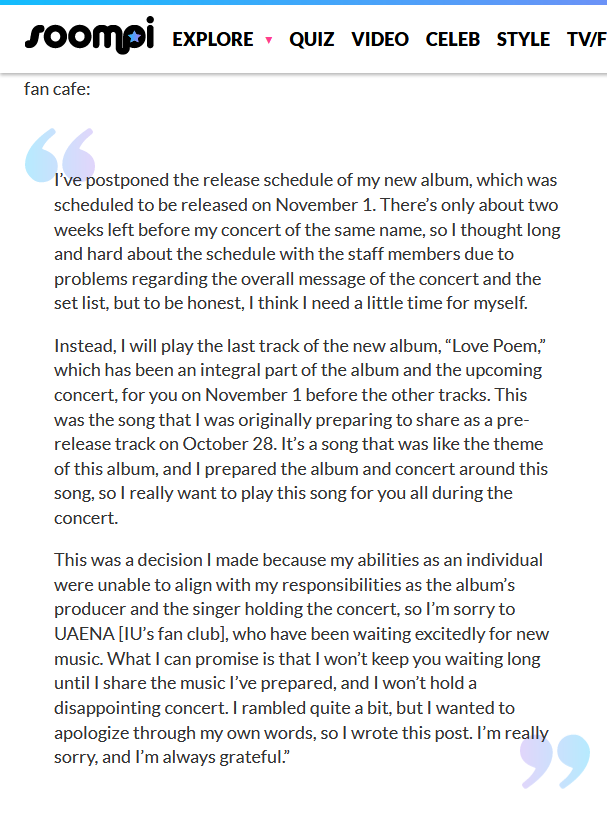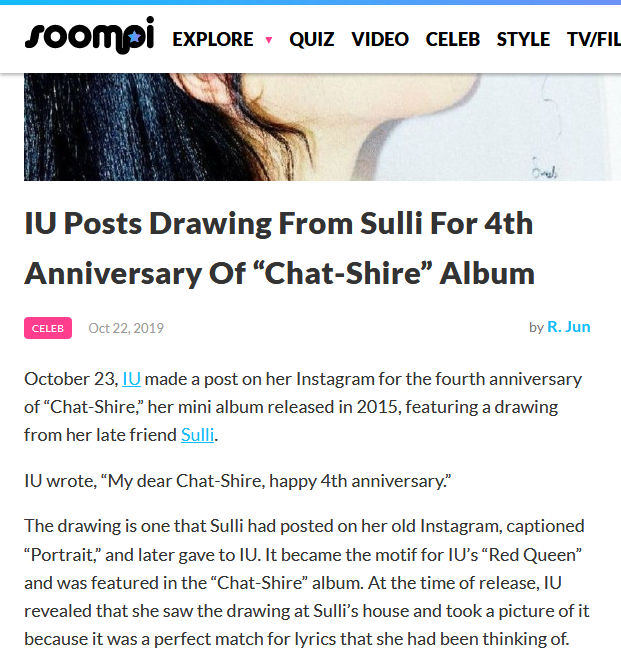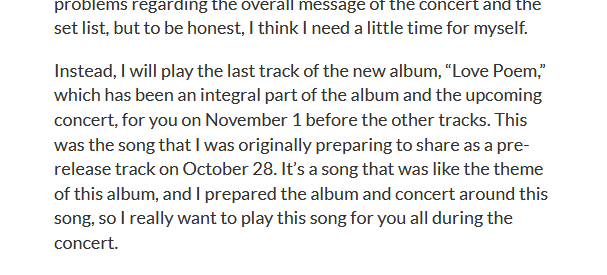TL;DR This post, which I drafted rapidly but struggled deeply with publishing, is inspired by work I was doing on the question of ?What makes life worth living?? ? say, as opposed to a short, or even continuing subsistence. I resolved this question in principle and set it aside for a couple of weeks, during which time I happened upon and fell in love with IU?s music. Then the news of Sulli?s suicide broke. Although I hadn?t heard of Sulli before, strangely enough, having deeply enjoyed IU?s work, I felt compelled to revisit this question, along with the importance of understanding how we choose to forge human connection. In the west, the concept of having a strict divide between work and life is due, at least in part, to the unique social stresses produced in our lives here. How we experience stress is mediated by cultural idiosyncrasies, observable in the interplay of private, public, and social interactions. Understanding different cultures can be a source of inspiration in dealing with stress and anxiety, by putting into perspective how different concepts for interaction changes what is possible in our lives.
I had an interesting conversation with a friend recently about Korean cultural differences from the west, and we started off by talking about why we consume Korean media. My friend, being Korean, pointed out that (the inimitably developed and diverse offering of) Western media simply fails to present people who look like them. As a new, late-coming fan to narrow slices of Kmedia, I jumped on to say that for me, the cultural differences opened up opportunities to see different aspects of my personality actualized, in new and compelling ways. Being born and raised in Vancouver, I used to mainly just enjoy songs and TV in languages I natively understood (English and Chinese ? with rare, minor exceptions like opera). When I was younger, Kmedia to me was just the wasteland of creativity, ruled by manufactured content that only knew how to follow in the footsteps of the west. I still don?t enjoy the music of boy/girl groups that make it big internationally, or the heavily structured presentations of Korean variety shows; but nowadays, I can appreciate more how cultural quirks help make Korea unique, and allow Koreans to build unique, interpersonal understandings. The conversation shifted to observations from my friend about the ways in which they had relatively easy access to a sense of belonging in Korea, from differences in relationships with police, to general attitudes towards safety and society.
Now, there are a million other interesting examples of cultural differences ? from honorifics and greetings, to (oft hilariously) blatant misuses of English words as expressions. Instead of looking at all these phenomena individually to paint a cultural contrast (I mean just watch Korean TV on your own time), what really drove these differences home for me recently was the (hugely popular) artist IU?s unique response to the tragic suicide of her very good friend, Sulli (former member of the Kpop girl group f(x)), who apparently lost her life due in part to the barrage of hate speech she received online. It?s doubly sad that IU was also the artist who last year, hijacked her own awards acceptance speech (?Through the Night? won Digital Song of the Year) to express her sorrow at a different celebrity friend, Kim Jonghyun?s, suicide, reminding her fellow celebs to take care of themselves.
As the news of Sulli?s death broke on October 14, other celebrities took to social media with a range of messages, from disbelief and deeply moving goodbyes, to the public excoriation of cyberbullies. A beautiful song titled ?Peach? that IU had written for Sulli back in 2012 re-entered charts as people listened in remembrance, and almost immediately, IU?s managing company announced that her latest album, scheduled to be released on November 1, was going to be delayed. The company also announced that they would more vigorously pursue hate speech with legal action, in defense of their label?s artists.
Meanwhile, IU?s social media remained silent ? until October 20, when she posted the following apology to her official fan cafe (as translated on soompi):
 <https://www.soompi.com/article/1358108wpp/iu-stuns-in-1st-teaser-for-fall-comeback-shares-new-details>
<https://www.soompi.com/article/1358108wpp/iu-stuns-in-1st-teaser-for-fall-comeback-shares-new-details>
On October 22, she followed it up with an Instagram post, which soompi reported on as follows (the IG post is included below):
 <https://www.soompi.com/article/1360805wpp/iu-posts-drawing-from-sulli-for-4th-anniversary-of-chat-shire-album>. ?Red Queen? is a song from ?Chat-Shire?
<https://www.soompi.com/article/1360805wpp/iu-posts-drawing-from-sulli-for-4th-anniversary-of-chat-shire-album>. ?Red Queen? is a song from ?Chat-Shire?
IU?s public response to her friend?s passing, with a simple apology for delays in her work, followed by a continued celebration of life and commemoration of her friend, is perhaps an example in the extreme of a reaction that I found unimaginable, in part because of its cultural idiosyncrasy. Firstly, despite her celebrity status, there is no compulsion to use this moment as an opportunity to publicly comment on society through her social media platforms; either she sees it as beyond the scope of her duties as a public figure, or she thinks that social media is too direct and intimate a space for a chiefly political comment about hate speech. The point being that she is not avoiding formal confrontation on hate speech, but has decided to avoid invading her social media platforms with it. That is a war she is leaving for her management company to wage on her behalf via regular media, and the courts, where appropriate. Secondly, this does not take away from the gravity with which she sees the responsibilities and privileges of her public life, highlighting how important her actions as a public figure are to her in her message (e.g. including her responsibility as an artist to the timely release of previously announced content).
In other words, for IU, being a celebrity is both a privilege she has, and a burden she bears with an earnest, absolute solemnity. Her constant awareness of her role as a public figure means that she places enough emphasis on this responsibility to prioritize succinctly apologizing for any formal delay ? regardless of personal circumstances, including the death of her close friend. This de-emphasizing of individuality is the most baffling aspect of her response to me as a westerner: in the west, we?re used to resting so much of our identity on self-expression, which in terms of our attitudes to interaction, tends to take priority over considerations for those around us. That is, we have different ideals and concepts for social interaction, that taken collectively tend to mean that our individuality manifests itself to a greater degree in social contexts. Western celebrities are great examples: they typically exemplify this quality as people we expect to have interesting, unique identities, who stay relevant by standing out as they express those in different contexts. It?s what we?re used to seeing, and find inspirational (i.e. almost an essential part of what makes them good celebrities) ? and it needs to be explicit. But for IU in Korea, as in some other East Asian cultures, IU?s work is not just her own to do as she ultimately pleases, or not: it is made valuable by the public, but also reflects an investment that supports many staff members, many of whom supported her in turn through her youth, or were otherwise instrumental to her success ? perhaps in spite of their own, personal difficulties. In this specific case, for the public, Sulli was a celebrity, but for IU, Sulli was also her friend, whose untimely death is a terribly intimate tragedy. Attending a private funeral with Sulli?s friends and family is one thing, while commenting further or grieving publicly might be another thing entirely.
On the flip side of gravitas, it appears that in spite of this awful, personal tragedy, she does not wish to underestimate the potential importance her work has for others (namely us, her fans). My initial reaction reading her post was a typical ?? girl you have nothing to apologize for? ? but this is what made sense to her, and I think that in many ways, I like her reaction more than anything I might have imagined possible. It?s mature: positive, considerate, and completely unprivileged. Being an idolized artist is a big responsibility for her, on top of which her life?s work derives value from its cathartic impact on her fans, even though personally speaking, she ?owes? them nothing. She cannot forget her friend?s death (and this will doubtlessly affect her as an artist), but she also does not want to let that diminish her responsibility to everyone else who supports her life?s work. In a way, perhaps, seeing as this is something she cannot forget or ignore, her best effort to find closure involves doing her best to minimize the subsequent, negative effects of this loss on her life.
Essentially I find IU?s approach to mitigating personal sorrow and anxiety, as a public figure in Korea, inspiring, because I think this extreme example renders clearly how different cultural contexts can put personal problems into perspective. The persona she exemplifies in her reaction reflects a set of values that are universally relevant to the mitigation of social stress and anxiety.? In my experience, people tend to expect the problems they face to be more unique than they actually are, but also expect their idiosyncratic solutions to be less unique than is really the case. That is: human problems tend to be more universal than we think, but our individual solutions also tend to be interesting, idiosyncratic, and creative. This is what makes different perspectives so invaluable, because a social issue manifesting as a source of great pain for people in one culture may just be the course of daily life for people in another. Certain stresses can even become sources of cultural unity, when they originate from forces beyond individual control and are borne collectively, producing unique senses of belonging.
This is to also say that I think one of the chief reasons, as westerners, we should think of diversity as an end in itself (and not just useful for taking our relatively high sense of individualism down a few pegs) is made clear when we think logically about how we come up with approaches to dealing with life?s problems. Chief among the factors that allows us to deal with different problems is having a diversity of opinions, and thereby recognizing ourselves. This specifically implies the importance of sourcing perspectives from different cultural backgrounds, because while the interplay between the strengths and weaknesses of different people is (idiosyncratic, and therefore) difficult to objectively measure, differences in strengths and weaknesses between cultures can be abstracted, quantified, and compared, with relatively fewer degrees of freedom (i.e. thinking about solutions as potential sets of possibilities, rather than individually set directions). Having different sets of solutions is important for people to be able to find ways to work together in solving life?s problems, and to thus make up for individual or collectively idiosyncratic weaknesses. After all, living life, like finding closure, is also being able to react with dreams of what?s possible.
[1] I don?t pretend to know what IU is thinking, so I?m doing my best to avoid being purely speculative. Drawing much of my analytic inspiration from Hannah Arendt?s ?The Human Condition?, the part I find interesting is actually just how her response surprises me, and why I found it both understandable after seeing it, but unimaginable until I saw it. Also, that understanding her decisions requires me to think from her shoes, and deduce her reasoning from expressly outside western attitudes toward self-expression.
[2] Yes, this is a BBIBBI reference.
[3] I have to be careful here: I am not naively saying that people can get past grief by dedicating themselves more to work ? IU explicitly says she needs personal time to grieve. I am (non-normatively) saying that I think not allowing personal issues, however large, to absolutely take over her life at the expense of her treatment of all other relationships and responsibilities shows a deep sense of emotional maturity on her part.
[4] Here I draw on Hannah Arendt?s idea that in the modern world designed by the west, the social sphere has expanded to engulf the private and public realms, breaking down divisions that were clear, for example, in both medieval times and ancient Greece (thereby restructuring our relationships with family, friends, etc.). More on this in her book.
Special thanks to:
- Anonymous Querent, for an evening of analytic refinement, thoughtful disagreement, and forever refusing to compromise
- Kenrick Yap, CS student at UBC, for contributing lived experiences not only as inspiration, but also to influence my personal contemplations, and philosophical integrity
- Michael Cai, Public Health Inspection Student, for encouragement, cultural exposure, and putting up with me
Additional Reading:
- IU?s music ? much of which she produces, writes lyrics for, and even composes herself ? in the enduring lightness of which, I never fail to hear her deep courage in dealing with life?s struggles. Enjoy 🙂
- Hotel del Luna is a Kdrama starring IU, that finished airing in September, in which Sulli did a cameo at IU?s request. This also unfortunately means it was one of Sulli?s last projects. I watched it with timed comments after Sulli?s passing, and (for a number of coincidental reasons beyond being in the honeymoon phase of my IU fandom :P) really enjoyed it. Made me think more about what matters in life.
- Hannah Arendt?s ?The Human Condition? (<? link to PDF)
- ? basically anything by Hannah Arendt to supplement that; ?The Promise of Politics? is a shorter fling that conveniently bridges many of the ideas in ?The Human Condition? with broad strokes, but no less impact. I know, it?s absurd to recommend books as ?Additional Reading? at the end of a blog post; these are only here at the level of ?imho, if you were to read 1 philosophy book in your lifetime? Arendt would not be a waste?.

